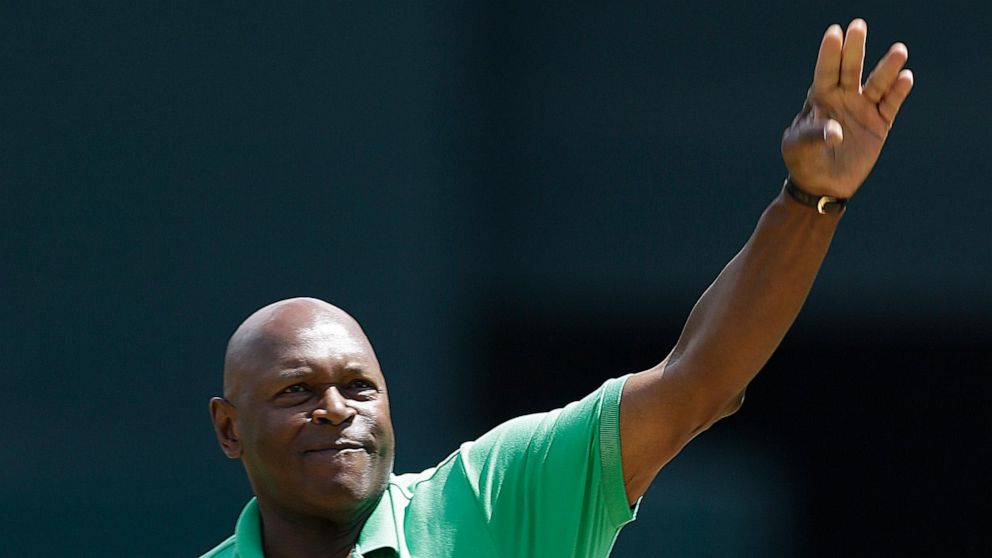Global Courant 2023-05-08 07:32:30
Vida Blue, a hard-hitting southpaw who became one of baseball’s biggest draws in the early 1970s and helped lead the brash A’s to three straight World Series titles before his career was derailed by drug problems, died Saturday, according to the team . He turned 73.
Oakland has not announced a cause of death. Blue had used a cane to assist his movement on April 16 at a 50th anniversary celebration of the 1973 Oakland Athletics championship team.
“He was captivating. He was handsome. He was caring,” ex-teammate Reggie Jackson said in an interview with The Associated Press on Sunday. “He was uncomfortable with the audience.”
Blue was named the American League Cy Young Award and Most Valuable Player in 1971 after going 24-8 with an 1.82 ERA and 301 strikeouts with 24 complete games, eight of which were shutouts. He was 22 when he won MVP, the youngest to win the award. He remains one of only 11 pitchers to win MVP and Cy Young in the same year.
Blue finished 209-161 with a 3.27 ERA, 2,175 strikeouts, 143 complete games and 37 shutouts over 17 seasons with Oakland (1969-77), San Francisco (1978-81, 85-86) and Kansas City (1982-83) . He appeared on the Hall of Fame ballot four times and received his most support with 8.7% in 1993, far short of the 75% needed.
“That Hall of Fame thing, that’s something I can honestly, openly say I wish I was a Hall of Famer,” Blue told The Washington Post in 2021. “And I’m sure this drug thing has hindered my path to the Hall of Fame – until now.
A six-time All-Star and three-time 20-game winner, Blue helped lead the Swingin’ A’s, as Charley Finley’s colorful, mustachioed team was called, to consecutive World Series titles from 1972-74. Since then, only the 1998-2000 New York Yankees have accomplished this feat.
He became the first pitcher to start the All-Star Game for both leagues, opening for the AL in 1971 and ’75 and the NL in ’78.
“I remember watching a 19-year-old phenom dominate baseball and change my life at the same time,” Dave Stewart, a generation later four-time 20-game winner for the A’s, wrote on Twitter. “There are no words for what you have meant to me and so many others.”
Jackson was shocked by how much weight Blue had lost when he saw him at the 50th reunion.
“I didn’t recognize him,” Jackson said. “I was devastated. I was shocked. That will stay with me for the rest of my life.”
Selected by the then Kansas City Athletics in the second round of the 1967 amateur draft, Blue made his big league debut with Oakland on July 20, 1969, about a week before his 20th birthday. He made four starts and 12 relief appearances, then spent most of 1970 with Triple-A Iowa.
Called up as the rosters expanded, he pitched a Kansas City one-hit shutout in his second start. In his fourth start, Blue pitched a no-hitter against Minnesota on September 21, at age 21 and 55 days, making him the youngest pitcher to throw a no-hitter since the live-ball era began in 1920.
“There are few players with a more decorated career than Vida Blue,” the A’s said in a statement. “Vida will always be a franchise legend and a friend.”
He held out after his MVP season, signing a $50,000 one-year contract. Blue didn’t make his first start of 1972 until May 24, going 6-10, mostly out of the bullpen. From 1973-76, he went 77-48, but his career World Series record was 0-3.
In 1975, he pitched the first five innings of a no-hitter against the California Angels, but was pulled early by manager Alvin Dark to rest him for the playoffs in a game completed by Glenn Abbott, Paul Lindblad and Rollie fingers.
Blue was one of the players to take on a leadership role with the A’s and clashed with Finley.
“We were very young kids,” Jackson said on Sunday. “Vida was from Louisiana and was black, and because I was black, being black in a white league and a white world, it affected a lot how you treated yourself, how you acted, because you were always colored first.”
Finley attempted to trade Blue to the New York Yankees in June 1976 for $1.5 million and Joe Rudi and Rollie Fingers to the Boston Red Sox for $1 million each. Kuhn vetoed the deals under the commissioner’s authority to act in the “best interests of baseball.” In December 1977, Kuhn stopped Finley from trading Blue to Cincinnati for $1.75 million and minor league first baseman Dave Rering.
Blue was traded to the Giants in March in a deal that gave Oakland seven players, including outfielder Gary Thomasson and catcher Gary Alexander.
Blue was dealt to the Royals in March 1982 and released in August 1983. In December, he was ordered to serve three months in federal prison and fined $5,000 for possession of approximately one-tenth of an ounce of cocaine. Blue was sentenced to one year in prison, but U.S. Magistrate J. Milton Sullivant suspended most of the term.
Blue did not play in 1984 and was suspended by Major League Baseball for the remainder of the season on July 26 for illegal drug use.
He returned to baseball with the Giants for two seasons beginning in 1985. Blue was one of several players ordered by baseball commissioner Peter Ueberroth in 1985 to be subjected to random drug testing for the rest of their career.
Following his 2005 arrest in Arizona on suspicion of DUI for the third time in less than six years, Blue was sentenced to six months in prison after failing to complete his probation. But he was told he could avoid incarceration by spending time in a residential alcohol treatment program.
___
AP MLB: and








